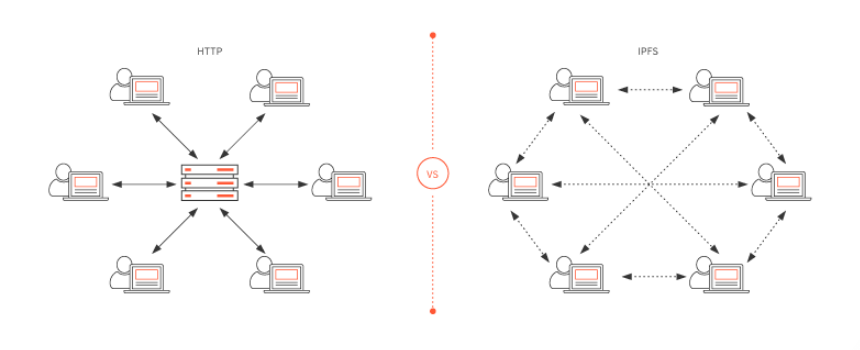What do we know about web pages?
- They are a way of sharing and presenting information - ok
- They can be accessed via internet - good
- They all need a file system, that unites and makes them accessible and/or able to interact with each other - even better
- HTTP is the current protocol most webpages use - oh, you are almost there
- HTTP is centralised and can be improved using decentralised technology - yeah, that’s it
IPFS is the way of implementing blockchain and decentralisation into all the internet and this article will tell you everything about the InterPlanetary File System. 🪐
What is IPFS?
IPFS (InterPlanetary File System) is a communication protocol made for creating a distributed file system and said to replace the existing HTTP Internet protocol. Content hosted on IPFS is not stored on a single server, but on multiple nodes.
Let’s dig a little deeper
HTTP (aka the current protocol) uses a central server, hosting all the web pages and exchanging the contents of those with all the computers, accessing them. In contrast, IPFS creates a net of nodes, each storing the information about a certain page. 📄
A visualisation of how this works:

The key difference between IPFS and HTTP Internet protocols is data being accessed not by the location of the site, but by the address of its content (file, document, image, folder) directly. 📩
"In some ways, IPFS is similar to the Web, but IPFS could be seen as a single BitTorrent swarm, exchanging objects within one Git repository. In other words, IPFS provides a high through- put
content-addressed block storage model, with content- addressed hyper links." - said the solution’s author Huan Bennet in the project’s whitepaper. 📎
Which problems are solved?
IPFS solves the problems of HTTP, which routes all traffic through centralized servers, causing additional costs and the risk of mass outages due to server problems. The IPFS network allows nodes to download and transfer files not only from one server, as implemented in HTTP, but from all the other system nodes at the same time. When a user on the IPFS network requests a file, the IPFS network finds the nodes holding the required hashes and retrieves the data. 🕵️♂️
Another quite obvious advantage is the lack of censorship, meaning no resource can be blocked. You could suggest that such an approach might lead to law violations, but we can not agree, because no one restricts you from filtering the content, you consume. Decentralisation also means public access to all the data inside the net, so every illegal can be easily monitored. 🙌
Is IPFS actually better?
We can’t say whether it is better or not, since the format isn’t fully supported yet. Google Chrome, for example, will require you to download a web extension to access IPFS links. Protocol Labs, however, did a fantastic job on coming up with an idea and making it into life afterwards.
Stay tuned 📻